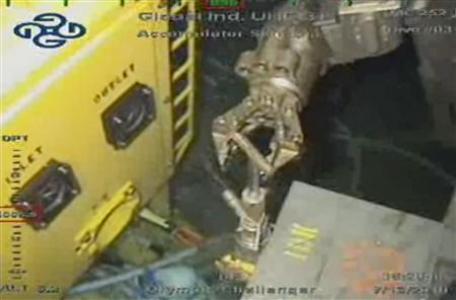BP To Proceed With Crucial Test On Leaking Gulf Oil Well
Country: USA
Author: Kristen Hays

Work continues at the site of the BP oil well spill in the Gulf
of Mexico, in this image captured from a BP live video feed July 13,
2010.
Photo: Reuters/BP/Handout
BP Plc will go ahead with a key pressure test on its ruptured Gulf of Mexico well to determine if it can proceed with a plan to temporarily seal the well, a senior U.S. official said on Wednesday.
Retired Admiral Thad Allen, who is overseeing the U.S. effort to deal with the disaster, said the decision was taken after a day of intense deliberation that reached the level of President Barack Obama and his cabinet.
"We'll be releasing an order to BP to proceed with the well integrity test, but we gave them some additional direction. We did this to be sure we were taking due care .... to make sure that we didn't do any irreversible harm to the wellbore," Allen told reporters in a briefing in New Orleans.
The British energy giant said earlier on Wednesday it was worried testing a new cap might further damage the deep-sea well and make containing the oil even more difficult and had not yet decided whether to proceed.
In Washington, the White House said that after discussions between BP and senior government officials it had been decided that "the test should now proceed with several modifications and safety requirements."
The leak, which began after a deepwater rig exploded on April 20 killing 11 oil workers, has become worst offshore spill in U.S. history, causing an economic and environmental disaster along the Gulf Coast.
The tests will take between six and 48 hours.
If they indicate that sealing the well might cause even further damage to the equipment on the ocean floor or to the well itself, the capping device would stay in place. It would become part of the system to capture the oil and siphon it to ships on the surface.
Nansen Saleri, former head of reservoir management for the world's largest oil company Saudi Aramco, had told Reuters before the announcement that BP should forego the test and keep using surface vessels to collect leaking crude until a relief well intercepts and plugs the leak by mid-August.
"They already have a relatively robust remedial program in place. It's the safe option," said Saleri, now president and chief executive of Quantum Reservoir Impact in Houston.
While they waited for BP to move ahead, some investors sold off their shares but trade was thin as they watched to see what would happen.
"I think we've reached a wait-and-see point, it might be too late to take profits but it might be too early to buy the stock," said Hugh Johnson, chief investment officer of Hugh Johnson Advisors LLC in Albany, New York.
In response, shares in BP ended 2.3 percent down in London in slow trade and were off about 1.9 percent in New York, with some analysts saying investors were likely cashing in profits ahead of further news on the new cap.
(Editing by David Storey)